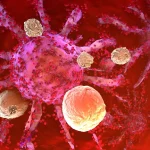Other hormonal therapies used in oncology
Learn about the types of hormone therapy available for cancers other than prostate or breast.
Corticosteroids
Cortisol is the natural hormone secreted by the adrenal glands under the action of the hormone ACTH secreted by the pituitary gland. One of its roles is to limit inflammatory response.
Synthetic cortisol (manufactured in the laboratory) includes many drugs used in oncology for many cancers and for many indications including:
Initial treatment
- Corticosteroids are used for the treatment of hematological cancers such as leukemia, lymphoma, Hodgkin’s disease and multiple myeloma in combination with chemotherapy and targeted therapy protocols.
Support treatment
- They are used to control the symptoms associated with cancer, its treatment and its progression;
- Other uses include being sometimes prescribed as an emergency treatment for hypercalcemia or compressions caused by the presence of metastases, mainly of the bone and brain.
Treatment in combination with chemotherapy
- To increase its efficiency;
- To prevent side effects such as nausea and vomiting.
Main types of synthetic corticosteroids (drugs)
- Prednisone;
- Dexamethasone (Decadron, Dexasone);
- Hydrocortisone;
- Methylprednisone (Medrol).
Thyroid hormone
Thyroid-stimulating hormone (TSH), is secreted into the bloodstream by the pituitary gland; its purpose is to stimulate the thyroid gland, which produces two hormones:
- the triiodothyronine or T3;
- the tetraiodothyronine or thyroxine, or T4.
Hormone therapy is required for everyone who undergoes a total thyroidectomy (complete removal of the thyroid gland) for thyroid cancer.
Several types of thyroid cancer are hormone-dependent. This means that thyroid hormones promote the growth of tumor cells. Hormonal treatment is therefore an indispensable treatment following surgery (resection of the thyroid gland) and radiotherapy with radioactive iodine (iodine 131).
This hormonal treatment consists of taking synthetic thyroid hormones in the form of a drug: levothyroxine or Synthroid.
There are two objectives, depending on the doses of medication used:
- At normal doses, treatment replaces the action of the thyroid and aims at maintaining a normal level of TSH (the pituitary hormone that regulates the thyroid gland): this is known as hormone replacement therapy.
- At high doses, it acts to prevent the secretion of TSH that could stimulate remaining tumor cells: this is known as antihormonal therapy.
Levothyroxine replaces the natural hormones that were produced by the thyroid gland prior to removal during surgery. It must be taken for life; precise blood monitoring and control are required to ensure the correct dosage.
Somatostatin analogs
These are drugs designed to lower the level of hormones produced and released by neuroendocrine tumors (NETs).
Neuroendocrine or carcinoid tumors are benign or malignant tumors that typically develop in the digestive tract. They can also affect the pancreas, lungs and more rarely, the testes or ovaries. They are slow-growing tumors. Because they can produce high levels of hormonal substances, these tumors can sometimes cause a carcinoid syndrome.
Carcinoid syndrome consists of a combination of symptoms such as hot flashes, abdominal cramps, and heart and lung problems.
The symptoms of carcinoid syndrome are controlled or prevented with the use of a somatostatin analog. The medication most commonly used is called octreotide (Sandostatin, Sandostatin LAR). It is available in 2 forms, fast-acting or long-acting, and is administered by intramuscular injection.
Progestin
Synthetic progestin is the major type of hormone therapy used to treat cancer of the endometrium (the inner lining of the body of the uterus). Endometrial cancer is a hormone-dependent cancer because the secretion of estrogen by the adrenal glands after menopause influences its development and growth. On the other hand, progesterone has a protective effect. Progestin is a drug that acts like progesterone (female hormone) and slows down the growth of endometrial cancer cells.
The following progestins are used to treat endometrial carcinoma and advanced or metastatic sarcoma of the uterus. They are administered either in daily doses, taken orally, or in the form of a long-acting injection. These drugs are called:
- Medroxyprogesterone (Provera);
- Megestrol (Megace, Apo-megestrol, Nu-megestrol, Lin-megestrol).
Other drugs already described in this column may also be given to treat advanced endometrial cancer: anti-estrogens, LHRH agonists and aromatase inhibitors.

































